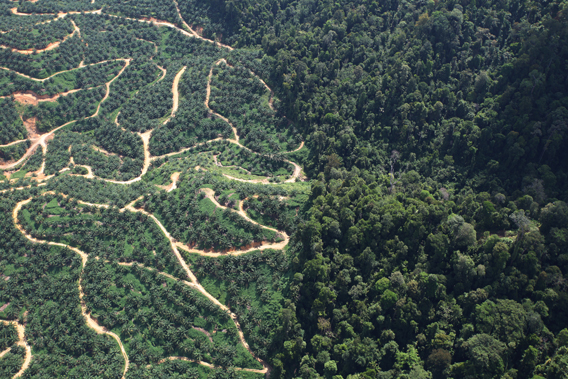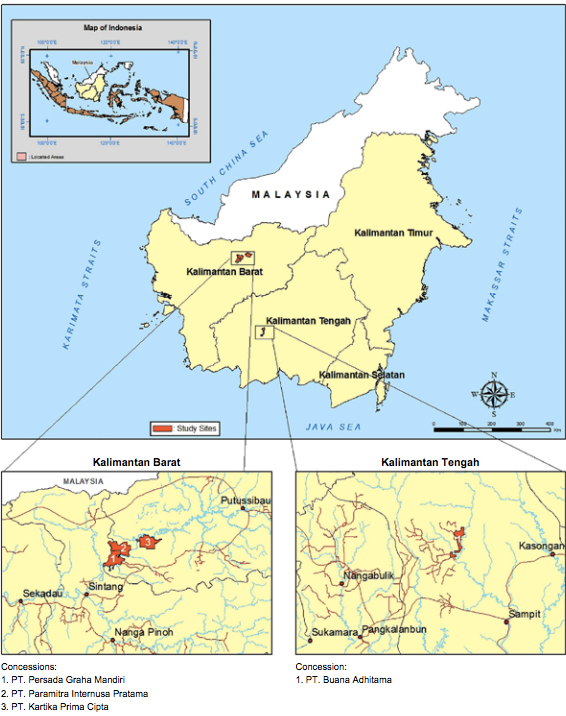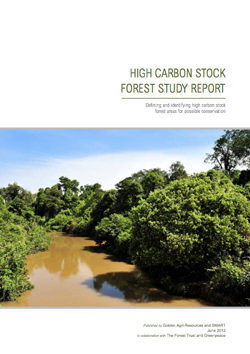
Oil palm and forest in Borneo
One of the world’s largest palm oil companies has become the first to identify and disclose high carbon forests and peatlands in its concessions.
Golden Agri-Resources Limited (GAR), the owner of Indonesia’s palm oil giant PT SMART Tbk, on Monday published a carbon assessment [PDF] of its holdings in Indonesian Borneo. The report is an important milestone under GAR’s forest conservation policy, which prohibits conversion of land with more than 35 tons of carbon per hectare and moves the company toward a zero deforestation target.
The study reported carbon stocks exceeding the 35-ton cutoff in a range of forest types, including low to high density forests and in areas of old regrowth. Young scrub, deforested grassland, and open land were suitable for planting, according to the carbon assessment.
The High Carbon Stock report was released just days after Greenomics, an Indonesian activist group, independently concluded that GAR was avoiding conversion of forest and peatlands for plantations. The analysis by Greenomics was based on satellite imagery and a review of legal documents from the Ministry of Forestry and local authorities. Until the analysis, Greenomics had expressed skepticism on GAR’s forest policy.
The High Carbon Stock report was immediately welcomed by Greenpeace, whose campaign against GAR and its customers from 2008-2011 pushed the company to establish the policy.
“Golden Agri-Resources is providing a clear industry example that it is possible for a company to identify which forests should be set aside for conservation,” said Bustar Maitar, head of Greenpeace Indonesia’s forest campaign. “This represents a critical milestone in the fight to end deforestation for palm oil.”
GAR’s forest conservation policy is the product of collaboration with The Forest Trust (TFT), a non-profit that has been helping GAR assess the conservation value and carbon stocks of forests within its concessions. GAR has permits to convert these areas to oil palm plantations but has voluntarily committed to conserving them instead.

Map of Kalimantan, Indonesia, with the location of the four HCS forest study concessions. Three concessions are in the province of Kalimantan Barat (West Kalimantan), and one concession is located in the province of Kalimantan Tengah (Central Kalimantan).
GAR’s policy also commits the palm oil producer to gaining free, prior and informed consent from indigenous and local communities in developing new plantations and complying with internationally “accepted certification principles and criteria.” The policy applies to all plantations GAR “owns, manages or invests in regardless of the stake,” according to the company.
GAR’s commitment comes at an important time for Indonesia, which is nearing a pivot point that could transform the country’s historic development model away from deforestation-intensive industries, which account for a declining share of the economy but generate the lion’s share of greenhouse gas emissions. Indonesian President Susilo Bambang Yudhoyono recently laid out a 7/26 vision, which targets seven percent annual economic growth with a 26 percent reduction in emissions from a projected 2020 baseline.
But Yudhoyono’s reforms — including last year’s moratorium on new logging and plantation concessions in primary forests and peatlands — have been stymied by powerful interests in the forestry sector. The battle over the forest moratorium made it clear that low carbon development won’t happen in Indonesia without significant private sector leadership like that exemplified by GAR’s policy.
Related articles








